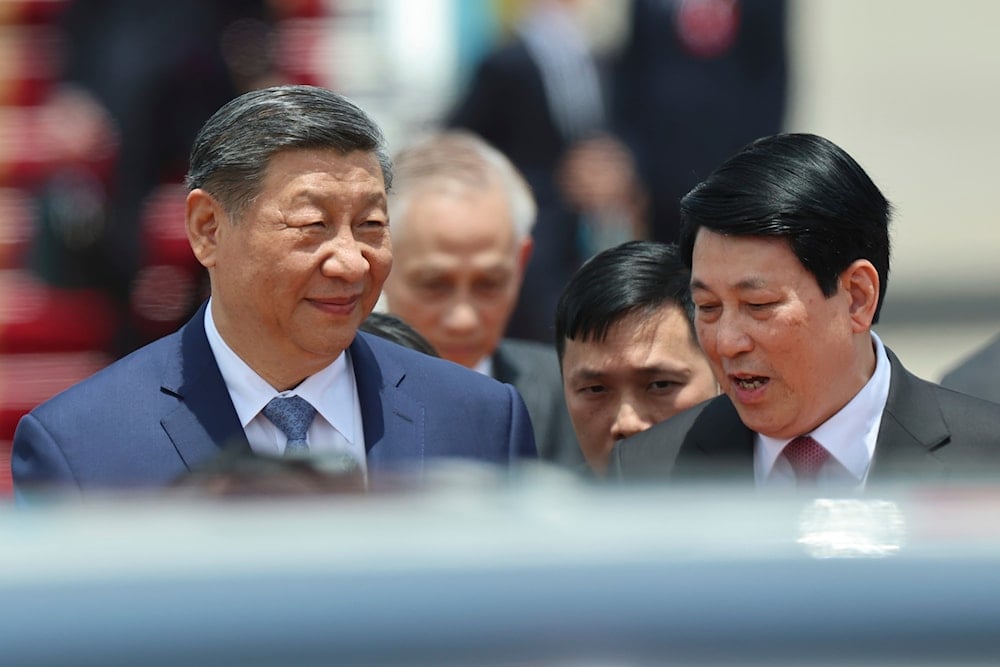Xi Jinping warns protectionism 'leads nowhere' during Vietnam visit
China's president arrives in Vietnam as part of a southeast Asia tour that will see him also visiting Malaysia and Cambodia.
-

Chinese President Xi Jinping, left, speaks with Vietnam's President Luong Cuong on his arrival at the Noi Bai International Airport in Hanoi, Vietnam, on Monday, April 14, 2025. (AP)
Warning that protectionism leads nowhere and that a trade war would produce no winners, Chinese President Xi Jinping began his Southeast Asia tour in Vietnam, as reported by state media on Monday.
Xi is set to visit Vietnam, Malaysia, and Cambodia on his first overseas trip of the year as Beijing looks to strengthen regional trade ties and counter the effects of steep tariffs imposed by his US counterpart, Donald Trump. The President of China will be in Vietnam on Monday and Tuesday, marking his first visit to the country since December 2023.
The Chinese president said he looked forward to holding "in-depth exchange of views with Vietnamese leaders on issues concerning ties between the two parties and countries that have a global impact", in a statement reported by China’s Xinhua news agency shortly after his arrival.
Earlier, he urged Vietnam and China to "resolutely safeguard the multilateral trading system, stable global industrial and supply chains, and open and cooperative international environment," reiterating that a "trade war and tariff war will produce no winner, and protectionism will lead nowhere" in an article published on Monday in the Vietnamese state-run Nhan Dan newspaper.
Vietnam's top leader, To Lam, said his country is always ready to work with China to make bilateral cooperation more substantive, profound, balanced, and sustainable, according to an article written by Lam and published on the government’s news portal on Monday.
Vietnam's Deputy Prime Minister Bui Thanh Son told state media that both nations are expected to sign approximately 40 cooperation documents.
The bamboo approach
China and Vietnam, both governed by communist parties, already maintain a "comprehensive strategic partnership," which represents Hanoi's highest level of diplomatic ties, while Vietnam has long adhered to a "bamboo diplomacy" approach that aims to maintain strong relations with both China and the United States.
Although the two countries maintain close economic ties, Hanoi aligns with US concerns over Beijing's growing assertiveness in the contested South China Sea, a region where China claims nearly all territorial rights but faces disputes from the Philippines, Malaysia, Vietnam, Indonesia, and Brunei.
The Chinese leader emphasized in his article on Monday that Beijing and Hanoi have the ability to resolve their disputes through dialogue, stating that "With vision, we are fully capable of properly settling maritime issues through consultation and negotiation."
On the other hand, the Vietnamese leader Lam wrote in his article that "joint efforts to control and satisfactorily resolve disagreements... is an important stabilizing factor in the current complex and unpredictable international and regional situation".
Vietnam, with its Chinese imports totaling $161.9 billion in 2024, was the biggest buyer of Chinese goods in Southeast Asia, followed by Malaysia with a bill amounting to $101.5 billion.
Strengthening ties with Southeast Asian neighbours could also serve to counterbalance the effects of a more closed United States, which was the largest single recipient of Chinese goods last year, according to AFP, at a time where the global economy is witnessing an upheaval due to Trump's sweeping tariffs.
'China wants a deal,' Trump claims
Trump on Wednesday described China as the "biggest abuser" in trading history, accusing Beijing of profiting heavily at America's expense. Speaking to reporters at the White House, Trump said China made $1 trillion off trade with the United States in 2024, a situation he called "not right."
"China was by far the biggest abuser in history," Trump stated. "A deal can be made with every one of them. A deal is going to be made with China. A deal is going to be made with every one of them. And there'll be fair deals. I just want fair deals," he added.
Later, Trump said he is open to meeting with Chinese President Xi Jinping, calling him a "friend."
"Sure, I’d meet with him [Xi]," Trump told reporters. "He's a friend of mine. I like him, President Xi, I like him. I respect him."
Trump also commented on the possibility of reaching an agreement with Beijing, suggesting that China is interested in negotiations but struggling with how to proceed.
"China wants to make a deal. They just don't know how quite to go about it. It's one of those things. They are quite proud people, and President Xi [Jinping] is a proud man. I know him very well, and they don't know quite how to go about it, but they'll figure it out in the process of figuring it out," Trump said.

 5 Min Read
5 Min Read










